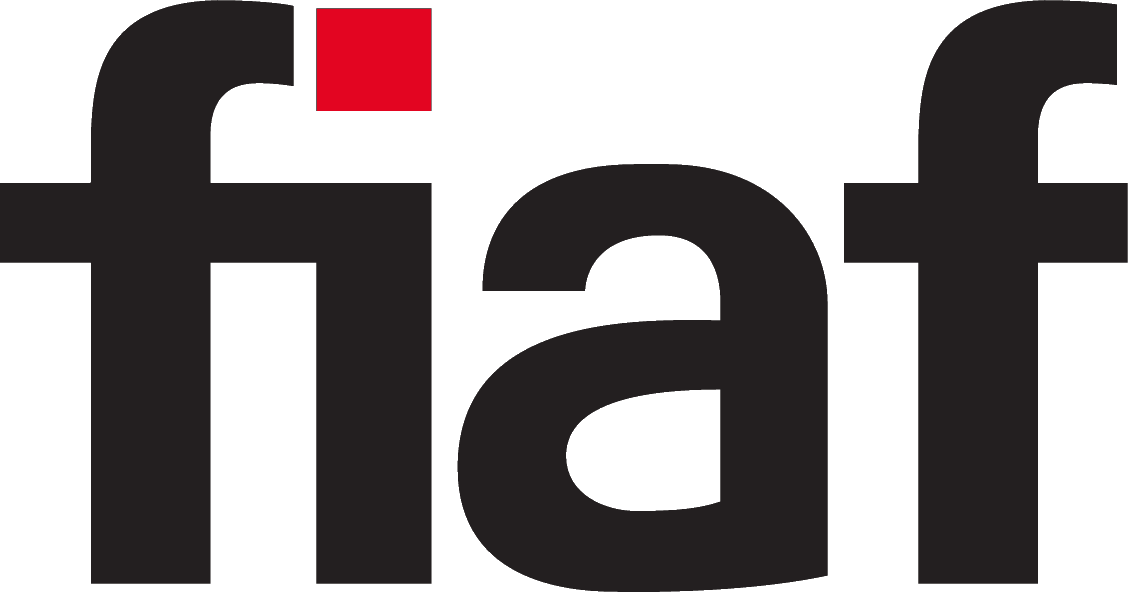2021 BAVASS Participants
Please find below the list of all confirmed participants in BAVASS 2021. Note that they are sorted in the alphabetical order of their surname.
The list of BAVASS 2021 lecturers is available HERE.
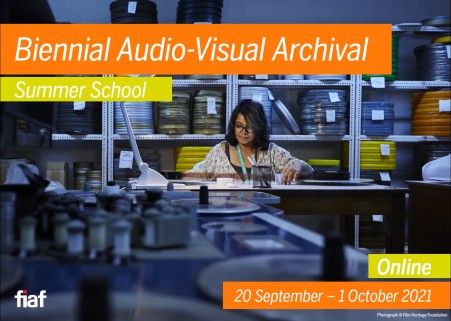
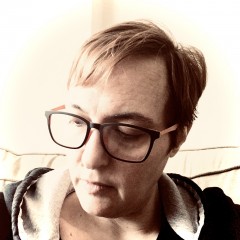
Monia Acciari
I am an Associate Professor in Film and Television History at De Montfort University within the CATHI (Cinema and Television History Institute) Research Institute. We have recently joined FIAF as FIAF Supporters in light of the extensive number of archives we currently curate. For this reason, we do hope to gain fundamental knowledge to support the access of their coontent. In the past two years I have facilitated the acquisition (through donation and national grants) of three collections:
1. The Indian Cinema Collection from the London Cinema Museum
2. Anita Anand Zee TV Collection
3. Mahmood Jamal Channel4 Collection
The three collections are a testimony of the #circulation of South Asian cinema in the UK.
My experience with archives is mostly academic; I look at theories and histories around archives, and I am interested in exploring problem regarding: access, and the creative facets of archives. The archives I curate are essentially non-film based and this course would help me immensely particularly while addressing: Photograph and paper conservation, Access and online engagement, AV preservation strategies and Film programming as part of the wider series of research-based film exhibitions and screenings programmed for 2022.
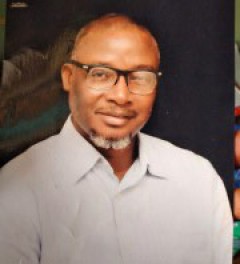
Adediran Ademiju-Bepo
I worked previously for about eight (8) years with the Nigerian Film Corporation, Jos, Nigeria and I worked fairly closely with the National Film Video and Sound Archive, NFVSA, a department of the NFC. I was part of the annual commemoration of Archival Days while at the NFC as well. I have written a paper touching on the archiving of Nigerian films and the prospects for heritage studies and museums. I have also participated in the workshop on archiving held at the National Film Institute, Jos, by the Goete University and other partners.

Justina Akporherhe
As a Film Archivist, I catalogue posters, books, programmes, films and film related materials. I am also responsible for the management of the film database. I assist in the preservation for posterity which include film cleaning, inspection, rewinding, sorting, documentation etc. I also assist in film acquisition and client services.
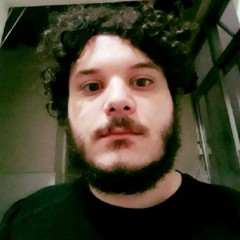
Igor Andrade Pontes
I've been an intern in Cinemateca do Museu de Arte Moderna do Rio de Janeiro between 2013 and 2014. During my graduation in Cinema studies I worked with a research group investigating the "Globo Reporter" film collection at Cinemateca do MAM. After that, from 2011 and 2013 I was a trainee at the Film Archive of the Centro Tecnico Audiovisual (CTAv), a federal institution in Rio de Janeiro. Also during 2013, I worked as a trainee at Museu da Imagem e do Som in Rio, digitizing photos and collaborating with researchers who used the institution's archives. In 2012 I was selected and participated of the "Collegium" group during the Pordenone Silent Film Festival. In 2018 I participated in the activities of APEx program (MIAP/NYU) in Rio de Janeiro. In 2019, I was invited to coordinate a presentation of the "Encontro de Arquivos" during Ouro Preto's Film Festival; also in 2019, I participated as a listener in the seminars organized during the BRICS Film Preservation Encounter. Between 2016 and 2021 I worked as a film preservationist and film researcher at CTAv.
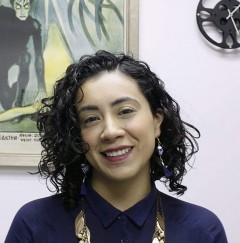
Sofia Arevalo
I have been in charge of the preventive conservation of the national film archive for the last 10 years, my activities include supervision of the acidity diagnosis, management of the activities related with its condition report, proposal of materials for digitization, supervision of loans of film materials nationally and internationally. I have worked with cellulose acetate, cellulose nitrate and polyester materials. Among my activities is also the supervision of the preservation of audio and video materials that are part of the collections of the institution.
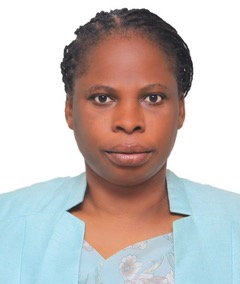
Kudirat Ayoola
I have been working as archivist for over 14years and have experience in maintenance of the archival equipment and machinery in liaising with engineering department of the organization, storage and ascertaining of films for restoration, scanning and storage for posterity. Initiating research, workshop and seminar themes and proposals for implementation, experience in film inspection, repair and identification, Keeps and maintains film restoration index form.
Masha Badalic
I have been working in film restoration for the past 8 years. I am a part of small group of people working on digitalization and digital restoration in the Yugoslav Film Archive. My job includes scanning, digital restoration, color correction, coordination, quality control and mastering.... I have worked on a number of very different project, from the restoration of the very first Balkan feature (1911), numerous archive movies and documentaries in between 1910s-40s, and also more than 30 features from the 50s and onward.
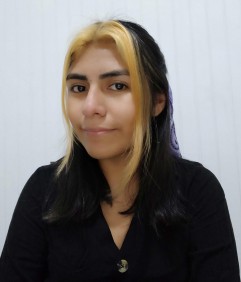
Guivicsa Justa Baldeon Diaz
I participated in the online seminar "The challenges of the cinematographic heritage" this 2021. The experience in general was very illustrative, by all the topics covered in the seminar. I met new processes that have to be taken into account in a film. In turn, among all the participants, a network of contacts was generated to encourage the dissemination of our files.
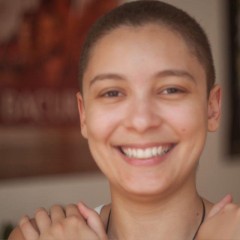
Laura Batitucci
I'm a film student at Universidade Federal Fluminense, Niterói, Rio de Janeiro. At the university, we have an Audiovisual Preservation Laboratory (LUPA/UFF), which is in fact the first university film archive in Brazil - it’s focused on amateur small gauge films. Since 2018, I’ve been engaged at the laboratory, having done internships and volunteer work.
My work at LUPA has transitioned between many different areas of film preservation. I have knowledge of procedures such as revising film at the winding bench, cataloguing and identifying material. I’ve also worked with digital restoration, using editing softwares such as DaVinci Resolve and Adobe Premiere to create access files of some of LUPA’s digitized films.
I’ve also helped organizing international events such as APEX Rio 2018 – Audiovisual Preservation Exchange (MIAP-NYU), and also the Encontro de Preservação Audiovisual do BRICS (Audiovisual Preservation BRICS Congress). Those events were an opportunity to listen to many different experiences and perspectives on film preservation.
Now, I coordinate a research and cataloguing project of our largest 16mm collection. I also coordinate an online study group on film preservation. After I graduate, I certainly intend to work with audiovisual archiving.
Karmine Beecroft
I graduated from the University of Michigan School of Information in 2010 with a master’s degree in information science (library services specialization). I have five years of experience in managing intensive hands-on digitization projects at US public universities, though the majority of this work has focused on paper materials and photographs (negatives, prints, slides, etc.). I sometimes work with film reels or magnetic media in need of digital reformatting for preservation purposes, especially as relate to my institution’s circus collections. My aim in participating in this course is to broaden and deepen my knowledge of film digitization so as to better prepare my department to address this growing need at our institution
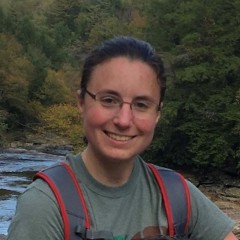
Ashley Behringer
My experience with film archiving began a decade ago when I volunteered and then worked at the Special Collections in Mass Media and Culture at the University of Maryland Libraries while attending grad school. I worked with film, video tape, and sound recordings, primarily creating basic inventories and pulling materials for researchers.
I expanded upon my work with film as a contractor for the National Park Service in which I catalogued and rehoused a collection of 16mm films.
Since 2017, I have worked in the Motion Pictures branch of the National Archives and Records Administration. My duties have primarily consisted of cataloguing, at highly varied levels of detail, film, video, and sound. We are also making forays into digital processing and the pandemic has accelerated this.
Lilia Ben Achour
I have been working at the Tunisian Cinémathèque for 4 years, during this period I was able to collect a collection of quite diverse film posters, especially following the internship I carried out last year, thanks to the internship policy between cinematheque , proposed by the FIAF.
Christen Brown
I work for the National Archives and Records Administration in the Moving Image and Sound Branch. I've worked with film and audio recordings for more than 4 years and received training from NARAs lab to learn about film preservation and handling practices we execute at NARA.
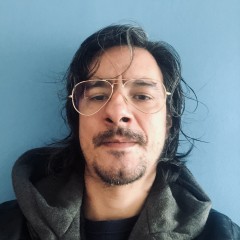
Marcelo Bueno Curvo
Hi, my name is Marcelo Bueno and I’m graduated in Social Communication with license in Cinema, since 2002.
I’m a former employee of Cinemateca Brasileira being worked there between September, 2017 to July 2020 when the institution was shouted down.
I served in the Film Preservation Department of Cinemateca, first as Public Relations receiving public demand for archive access, organizing solicitation according their nature and type, and also helping with the General Coordination week briefings. In 2018 the Cinemateca’s new manager an independent Public Relations Department and I was relocated to be the Film Preservation Department’s team briefer and scheduler. My job was to give weekly briefing to the Department Sectors', give then tasks and coordinate actions between those sectors. Receive Public Relations, Program and Documentation demands and organize then, set the Film Preservation agenda in order to deliver the solicitations. During this days I learned a lot about an archive structure, about data bases, material analysis, digital archive integrity, material storage according to the support and conservation degree also about film preservation, restoration and conservations process. Worked in there make me understood about public politics for film archives.
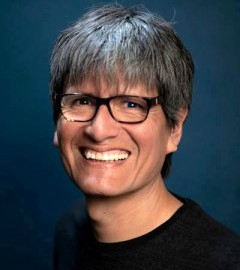
Ernesto Cabellos
I’m the director of Guarango, a non-profit film organisation based in Lima, Peru, that I co-founded in 1994. In these near three decades, we have witnessed the change from celluloid and analogue video to digital formats and have used them all. I’m a film director and producer, working on film restoration since five years ago. I was urged by the need of preserving not just my own films but the ones made by my mentors and older colleagues, all of them dealing with the disappearance of their body of work. Peru is one of the few countries in America that doesn’t have a national cinematheque, just a private one with limited capacity.
Since ten years ago, Guarango runs a postproduction facility with the aim of helping Peruvian cinema to overcome the obstacles to reach the screens of festivals, theatres and platforms around the world. Most of the films produced in Peru pass through our hands, for services like color grading, mastering and delivery. With the permission of the producers, we have been gathering a collection of near 100 Peruvian films in digital formats. We provide access to researchers, potential programmers and distributors with the prior permission of the rights holders.
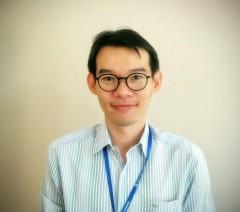
Sanchai Chotirosseranee
I have no hands-on archiving experience. My background is in film programming.
However, as deputy director, who supervises the Preservation section. I make decisions by asking questions from reliable sources and close consulting with my hands-on colleagues. Besides, I used to coordinate the restoring Santi-Vina and The Scar with L'Immagine Ritrovata. From these experiences, I have learnt the film archiving procedure and problems.
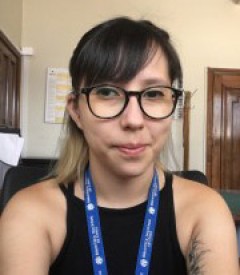
Nicol Coccio Muñoz
I am a librarian, M. A in International Heritage management and my experience is mainly related to description and access to film documents due to the fact that I work as a librarian in the Biblioteca Nacional de Chile. I have worked with small format films occasionally, helping in their conservation treatment and identification, but I cannot do as much as I wish to do for these documents since I do not have specific knowledge and all that I know was learned through self study and asking to other colleges.
My relation with film archiving was a consequence of my interest in audiovisual heritage. In fact, the topic of my undergraduate thesis was the preservation of audiovisual digital objects and then, my master degree research was about the management of orphan films in Chile, analyzing the experience of two initiatives which work with these kinds of documents in my country.
Nowadays I am working on the Photographic and Audiovisual Archive in the Biblioteca Nacional de Chile and on two parallel projects, one of them is about restoration of audiovisual documents of a Chilean musician.
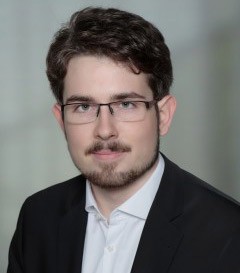
Lukas Maria Dominik
As a projectionist of the DFF at the Caligari FilmBühne I am currently being trained to project 16mm and 35mm film. While pursuing my bachelor's degree in film and literature at Johannes Gutenberg-University in Mainz I attended several courses dealing with film archives and archival policies, e.g. concerning the challenges of the digital turn, their role in the production of film historical knowledge and how they affect cultural memory, as well as the work of archives in the global south and their relationship to the global north and its archives. At FILMZ - Festival des deutschen Kinos I supervise several presentations of German film heritage, subsequently I am in contact with various archives.
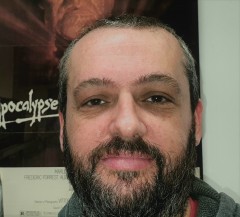
João Eiras
I’ve worked in Cinemateca Portuguesa’s conservation centre since 1997. My tasks involved the management of film collections, print traffic, and IT support. After 2019, I became curator of Cinemateca’s digital collections and have since attended a series of training programs and events, both in Portugal and abroad, in order to upgrade my skills in the areas of digital preservation planning, data storage and migration, file formats and data management, and risk assessment. I’ve done short internships in RTP (the Portuguese public television) and in the digital archive of Filmoteca de Catalunya (2019); I’ve attended the Winter School for Audiovisual Archiving 2019 (Netherlands Institute for Sound and Vision) and the “Archiving principles introduction” by BAD (the Portuguese association of archivists) (2020).
My current activities involve the ingest and cataloguing of all digital masters of both digitized and digital-born films, as well as conformation and file and format integrity checks. I am also responsible for all the technical operations pertaining to film sales.
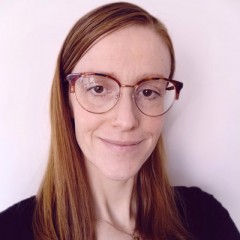
Angharad Griffiths
I have worked for the Screen and Sound Archive at the National Library of Wales since 2012. During this time, I have been instructed by John Reed and Mark Davies to care for and digitise film always employing the highest standards. I have had experience of conserving and digitising a wide range of films from home movies captured on super8 film to 35mm films intended for projection, the bulk of my work has centred around a working archive owned by the TV company ITV. This has involved balancing the conservation needs of the archive itself with the demands of a national broadcaster. My previous roles within the library included the conservation and repair of photographic negatives damaged by vinegar syndrome and digitising pre–World War 1 newspapers, as part of a mass digitisation project allowing online access to collections. My passion lies in conservation and restoration, and I have previously volunteered for the National Trust Wales and Ceredigion Museum for extended periods. I hold a First-Class Degree in Fine Art (Aberystwyth) and distinction at MA level in Multidisciplinary Printmaking (UWE) giving me a solid grounding in paper and photographic processes, and historical development. I have also attended undergraduate seminars in conservation.
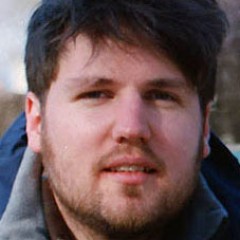
Florian Haag
After studying media art at the University of Arts and Design Karlsruhe, I obtained a Master’s degree from the University of Amsterdam for the program Preservation and Presentation of the Moving Image. As part of this program, I did an internship at the Austrian Film Museum, where I worked with a large and diverse collection, a donation of films from the Communist Party of Austria. After the university course that focused on the broad range of audiovisual preservation, I was introduced to the practical side of film archiving during my internship. I was lucky to get the chance to be employed by the Austrian Film Museum after that, and I am working there as a film archivist since almost two years now. My job there is on the one hand to inspect and catalogue donations and deposits, as well as occasionally digitizing small gauge films from the collection, and on the other hand to inspect and prepare projection prints for the regular cinema program of the Austrian Film Museum.

Jiaqi Hao
I major in Archives during my undergraduate education. After graduation, I get a position at the China Film Archive (CFA), a full member of FIAF. I am mainly responsible for film handling and inspection. The film is fragile and can be damaged easily; therefore, before archiving films, I need to check and inspect them carefully with a few pieces of specialized handling equipment. The professional inspection process is to date a film firstly, use rewinds to identify its technical characteristics, detect damage and decay in the following, and at last determine the further actions that are needed to protect the material. If there is any damage and decay on the film, I also need to clean it and make simple repairs on it.
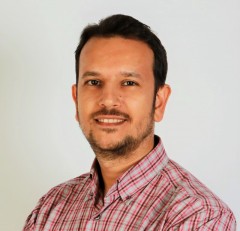
Çagri Inceoglu
I am a film scholar studying and teaching the history and aesthetics of film, and documentary cinema. I have conducted and taken part in media history, preservation of audiovisual heritage projects. My current position is associate professorship at Yaşar University.
My first encounter with film archiving was during my masters. I had faced the difficulties of the absence of the AV archives. Then, I began to elaborate on methodological issues of film history. This led me to my masters thesis (2001) that I investigated the structures and activities of some film heritage institutions compared to the current situation in my country. I also tried to emphasize the urgent need for modern archival practices to preserve the AV cultural heritage and the future of film studies.
Besides my other studies, I have published several articles, book chapters, presented papers on the topic and took responsibility for shaping AV archives of the schools I have worked.
I regularly follow the seminars, conferences, publications, and projects related to the archival world and film history relations. I attended the 4th FIAF Winter School.
Amanda Iorio
I started working at the Cinemateca do MAM in March 2016 and since then my responsibility is with the collection of equipment, but always working a little bit with the films as well. In 2019 I had an experience at LUPA - University Laboratory for Audiovisual Preservation at Universidade Federal Fluminense, where today I am doing a Master's in Cinema and Audiovisual. I've also took part in organizing a private film archive in Conservatória - RJ, and last year I've collaborated to the project Tales From The Vaults with two essays.
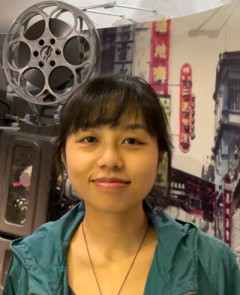
Chau Hei Aki KUNG
I have been working in the areas of film restoration, festival and archival programming. The most interesting aspects to me are the culture of cinematic heritage, the science of audio-visual preservation and collection management.
During my undergraduate studies, I started working at the Hong Kong Film Archive (HKFA) as an Intern and part-time Programme Assistant. After graduation in 2013, I continued working at HKFA as Project Assistant for programme coordination, research, writing, editorial and operational duties. Until 2016, I assisted in planning and organising exhibitions such as ‘Saving Film: Road to Film Conservation’ and 'Transcending Space and Time – Early Cinematic Experience of Hong Kong’, as well as some screening programmes and publications.
In 2018, I participated in Asian Film Awards Academy’s ‘Young Film Professionals Overseas Training Program’ on a one-month job placement at L'Immagine Ritrovata in Bologna, Italy. In the same year I worked for Fortune Star Media, one of the largest local commercial film library for restoration projects coordination and collection management; and co-founded the Reel to Reel Institute (http://reeltoreel.org), a non-profit organisation that aims at promoting film preservation and wider access of audio-visual heritage in Hong Kong by delivering public screenings, publications, education programmes and digitisation/restoration projects.
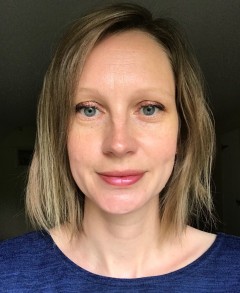
Michelle Kirby
I took up the post of Film Curator (Cold War/late 20th Century conflict) at IWM in March 2020, and have been one of the custodians of the museum’s film and tape archive since then. This has involved dealing with acquisitions, disposals, transfers and ongoing review of film and tape. Throughout this time I have been engaging with others, to raise public awareness of the causes, course and consequence of conflict, through IWMs unique archive material and through social media engagement, blogs/articles and collaborating with other film archives. Throughout my time at IWM I have been involved in cataloguing film and tape collections, whether building entries from scratch having watched newly digitized material, or reviewing and enhancing existing, well-developed catalogue entries. Prior to working at IWM, I spent two years volunteering at IWM, predominantly cataloguing oral histories, for collections management system, Adlib (viewing interviews and cataloguing to house style). I spent many years in a previous career in TV broadcasting, working for the BBC, often transcribing and logging rushes. I am trained on, and now regularly use, collections management system Axiell and I collaborate with Film Preservation. This year I was fortunate to attend FIAF’s Masterclass in Cataloguing Newsreels and Cinemagazines.
Igal Klein
I've been working 1.5 years at the Israel Film Archive. My daily work includes variety of tasks, depending on the current needs such as :
- Basic film (16 & 35 mm) handling
- Operating the Excel 1100 film cleaner
- Operating a scanner
- Basic file handling & video transferring skills
- Solid IT skills
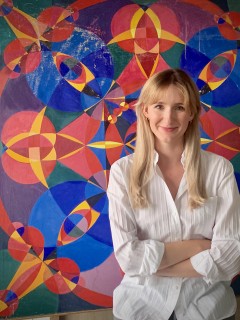
Aleksandra Koziol
My name is Aleksandra Kozioł and I have been working for FINA (National Film Archive - Audiovisual Institute in Poland) since 2019. In the first 2 years of my work in the institute, I was responsible for the conservation and preparation of FINA’s collection for the digitization process. The Conservation Team I belong to set standards for the storage of the collection. It was also responsible for film identifications, repairs, and comparison.
In 2021 I was promoted to Acting Head of Conservation Team at FINA. This means that aside from the responsibilities listed above I am also leading the work of 15 Conservators. My current responsibilities include strategic advice for collection conservation, cooperation with other verticals of the institution, and representation of the team externally. I am also preparing reports and analyses concerning selected projects our team is executing.
Saara Kruus
I am currently working as a film conservator at the Film Archive of the National Archives of Estonia. I have been in this position since February 2020, when the newsreels digitisation project started. As a result of this project, 120 hours of Soviet Estonian newsreels (the material spans 27 years) will be digitised and catalogued. My main activity and responsibility
have been choosing and preparing film elements for digitisation.
As I am concurrently studying Cultural Heritage and Conservation (specialized in film preservation) at the Estonian Academy of Arts, my Master's thesis is related to the project. The defending of the thesis will take place in autumn 2021.
Previous work:
I joined the film archive in 2015 as a BA student, inspecting the Estonian Academy of Security Sciences' film collection upon its transfer to the Film Archive.
The cooperation continued in 2016 when I inspected and conserved nitrate film collection. In parallel, I wrote a BA thesis about the preservation of the archive's nitrate film collection.
Bachelor thesis "Preservation of the Nitrate Collection in the Estonian Film Archives".
Course project 1 and 2 "Preservation of Cellulose Acetate Film in the Example of Estonian Academy of Security Sciences Film Collection at the Film Archives".
Daniel Lefverström
- I have a bachelors degree in History from Stockholm University; during these studies I came into contact with the archives in general.
- From may 2019 to august 2020 I held a temporary post (covering a parental leave) at the Swedish Film Institute’s film archive, where I was responsible for bringing elements in and out of the vaults according to protocol. This is how I first came into contact with film archiving.
- Since September 2020 I have position as a film archive apprentice at the Swedish Film Institute. During this year I have gained basic understanding of many different aspects of film archiving and film archiving equipment. I have just been granted to fulfill also the 2nd year of the Swedish Film Institute’s apprenticeship program.
- At the same time as conducting the apprenticeship I am studying archival science at The Mid University in Sweden.

Wenning Liu
I've been working in China Film Archive since 2013 when I graduated from China Film Art Research Center with a master's degree in film studies. During the last 7 years, I've been mainly responsible for international exchange of film elements and information, especially collection and digital restoration overseas loaning and promotion. Since 2015, corresponding with FIAF has become a part of my job and I've started to focus on translating and sharing the knowledge and resources from FIAF community to my colleagues as well as introducing and promoting Chinese film heritage to the world.
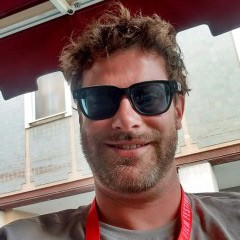
Simone Londero
I work as an archivist at the Cineteca del Friuli since 2015. I grew up professionally in the analog laboratory at the archive, where films are collected, repaired and stored, following FIAF recommendations and parameters. I am fluent in handling both 16mm and 35mm material. In recent times, following the needs of my institution, I've been asked to help in the digital laboratory, acquiring some new skills in digital matters and some experience in restoration projects. I also am responsible for the management of, and access to, the archive’s vast video collection (on magnetic and digital media), which I help cataloging, storing, and lending.
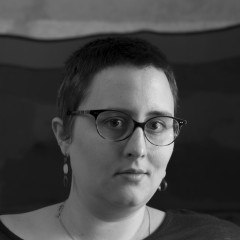
Eva Létourneau
I completed a B.F.A. in Film Production at Concordia University in 2014 and an M.A. in Film and Photographic Preservation and Collections Management at Ryerson University in 2016. During my studies, I did an internship at the National Film Board of Canada and a residency at the Cinémathèque québécoise. I have been working at the Cinémathèque québécoise for more than five years. I have held different positions at the institution, from film conservation technician to manager of operations for acquisitions and access to the cinema, television and new media collection. I am currently the Film Conservation Manager, a position in which I am in charge of ensuring the collection’s preservation, authorizing access to the collection, overseeing film inspections, while also participating in film restoration projects. Outside of work, I am also a filmmaker and film programmer for the Montreal Underground Film Festival.
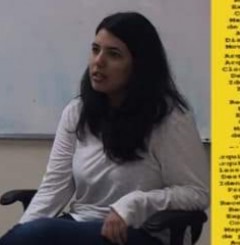
Juliana Mendes
A degree in History, Archival Science and, currently studying Library and Information Science. I was an intern at the Casa de Oswaldo Cruz (Fiocruz) film archival and I’m working at Cinemateca do MAM for three years. I’m currently responsible for the Information & Research Coordination, with special focus on film cataloging, organization of the non-filmic collections and creation of research instruments.
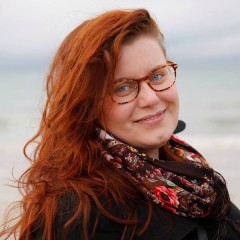
Ana-Maria Nascinschi
I'm a Film Archivist at Cinémathèque royale de Belgique. I graduated from the Master Valorisation des patrimoines cinématographiques et audiovisuels at Université Paris 8 in October 2020. I've had the chance to do my first full immersion into the world of film archives at Cinémathèque suisse, followed by a film repair internship at Hiventy. Nowadays I work with film for a wide variety of activities, including preservation, restoration, presentation, and research.
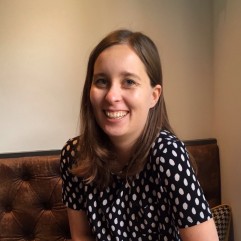
Bobbie Noë
In 2014, I completed the Master Preservation and Presentation of the Moving Image at the University of Amsterdam. As part of the program, I did an internship at VIAA (the Flemish institute for archiving) where I researched digital access to audiovisual collections for academic users. After my studies, I catalogued a corporate videotape collection at Ahold (an international retailer) and worked as a volunteer for the collection management department at the EYE filmmuseum in Amsterdam.
Since 2017, I have been employed at the Cinémathèque royale de Belgique (Cinematek) in Brussels, where I am working on a project related to the registration, digitization and preservation of film collections from a wide variety of institutions in Flanders. My work includes the identification, assessment and cataloguing of the collections and ensuring proper conservation conditions. In addition to this project, my role has expanded to include broader tasks within Cinematek, including assisting the Access department, the collection management of Cinematek’s film and videotape collections in general, general tasks related to digital archiving and quality control, creating inventories of incoming film and videotape collections and assisting researchers.
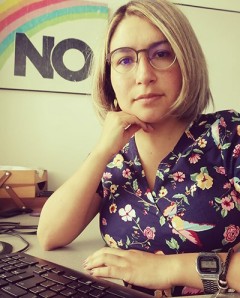
Luisa Fernanda Ordóñez Ortegón
I started my career as the archivist of Colombian filmmaker Luis Ospina: from 2009 to 2013 I curated his paper and photograph archive, and designed the Project for the digitization of most of the work he produced in videotape. From 2013 to 2015 I studied the P&P programme at UvA in Amsterdam. In 2015 I came back to Colombia to be in charge of Collection Management of Señal Memoria, the archive of public broadcasting history of my country. In 2018 I got the Media Studies Grant from FIAT, to research on Collection Management policies in broadcasting archives in Latin America, and I just published a book called “ The Audiovisual Archive and the Writing of History”, sponsored by the Cinemateca de Bogotá. Since 2020 I’m the director of the audiovisual archive of Caracol Televisión, the main commercial broadcast network in Colombia. I've worked mainly in the area of metadata and policymaking, I'd like to be updated in best practices and standars of film preservation, as I'm currently in charge of the preservation of an archive of more than 40 years of production that implies both film and television.
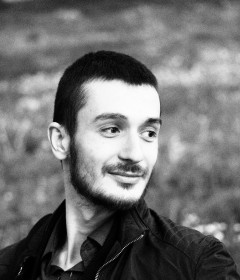
Angel Radev
I have a bachelor's degree in film studies and have worked in the Bulgarian National Film Archive from 2014 to 2015 in the International Relations department. In 2020 I returned to the archive as a full time film expert and am tasked with the creation of a new website and online catalogue for the archive. I have participated in migrating the BNFA's database and in selecting and subtitling films for theatre and online screenings. I took part in selecting and presenting Bulgarian titles as part of the FIAF initiative A SEASON OF CLASSIC FILMS. The selection was streamed live and is still available on our youtube channel.
Previously, I have worked in US owned NU BOYANA film studios in Sofia, Bulgaria as script reader and video editor. I have worked as an editor and assistant editor on several Bulgarian TV series and have nearly a decade of experience in film and TV post production, which I believe will help me in tackling the challenges of film digitisation and preservation.
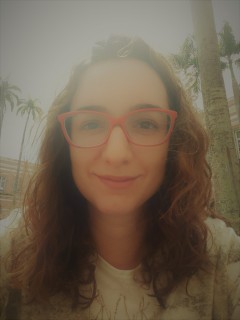
Ana Carolina Reyes
Since 2018, I have been working on the team responsible for the technical treatment of the audiovisual and sound collection of the National Archives of Brazil. And last year I became the leader of this team. My job involves documentation cataloging activities such as identification, description, indexing and database feeding. I also provide services to the public and monitor digitization services in external companies. Over these years, I've been learning a lot about audiovisual collections, either by participating in courses in Brazil, or by exchanging between older colleagues. But I feel I still have a lot to learn.

Guilherme Maggi Savioli
I attended the Film School at the University of São Paulo, from where I hold a bachelor degree. During my graduation, I pursued a specialization in Cinematography. In 2018, I attended a film preservation and restoration training offered by the University of Buenos Aires. During my stay in Argentina, I started an internship at the Museo del Cine Pablo C. Ducrós Hicken, where I worked at the nitrate archive, collaborating with the project "Nitrato Argentino". In 2019, I returned to Brazil and started working at the São Paulo Museum of Image and Sound as a digitization and digital preservation technician.
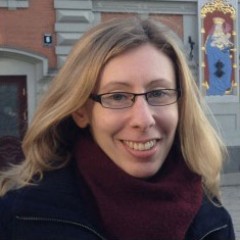
Katharina Schmitten
I work at the film archives of the Bundesarchiv/German Federal Archives in Berlin. As a member of the team responsible for the appraisal and description of film material in our collection, I am mostly concerned with films from the Weimar Republic and National Socialist period. Currently, I am preparing our collection of Second World War newsreels for digitisation, which includes describing and indexing the issues as well as choosing the items suitable for digital preservation (e.g. the most complete nitrate copy in our holdings). Prior to working at the Bundesarchiv, I studied history and social sciences and worked on a Ph.D. project in modern European history at Humboldt University Berlin. I took several courses in film history during my bachelor’s degree at Bielefeld University and graduated with a thesis about war movies from the 1950s Federal Republic.
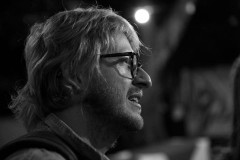
Juan Soto
Currently working in the digital department of the Filmoteca de Catalunya, I'm a Colombian filmmaker and film editor who studied Documentary at the EICTV in Cuba.
In 2010, I began working with archives as a source of footage to compose films and moving-image art-works with artists and filmmakers such as John Akomfrah, Phillip Warnell, Mo Scarpelli, among others.
As time went by, I understood the archives were esencial not only as footage so I embarked on a journey of learning further about it by myself: I first made a workshop hold at the Huntley Film Archive in the UK and attended three versions of the annual conference of Color in Film at the BFI and in 2018 I was part of the FIAF Film Restoration Summer School. In 2019 I made a residency at the FIlmoteca de Catalunya where I was in charge of a big fund of amateur and substandard reels which I had to change cans, physically clean and digitize.
A year after, I've been hired to work there. We are currently undergoing the digital restoration and deliveries to celebrate de 150 year of SEGUNDO DE CHOMÓN.
Primoz Tanko
I am a historian by education, who got a job on the archive project e-ARH.si. I was in charge of two areas, the digitization of paper material and, above all, the establishment of digital film material. I learned about the complex world of formats, codecs, storage principles, access and playback systems. My beginning of learning about film archiving was to prepare a user specification to set up a validation, management, and access system for digital film material. I was involved in creating the requirements for the digital film archive, for the storage of both digital born and digitized material.
I am now continuing as an archivist for film material, which means mainly archival taking over the film by law, obtaining the film from private creators, importing films into the above-mentioned system. I get to know the film inventory system and try to follow the FIAF film inventory recommendations. At the same time, I take care to make the film available to users, both in digital and analog form.
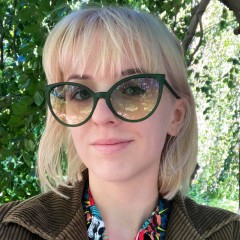
Aleksandra Tomkiewicz
I have been working in archiving for almost 2 years now. I started out as a volunteer in the National Library of Wales where I helped with digitising various audio recordings. Then I graduated from university and moved back to Poland where I started my job as a junior film conservator and archivist in FINA. Since then I have been working closely with not only film, but also paper materials such as scripts, screenplays or storyboards. In 2019 I was a member of the Collegium at the Pordenone Silent Film Festival where I actively took part in various discussions and lectures, some about film archiving, conservation or identification. In 2021 I finished a postgraduate course in document archiving which provided me with basic knowledge of archiving in general.
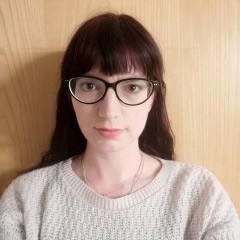
Emma Towner
I began working at the Screen and Sound Archive at the National Library of Wales (NLW) in 2013 as a Curatorial Assistant on the British Film Institute (BFI) led Unlocking Our Film Heritage (UFH) project. During my time in this role, I cleared copyright of films included for the project, prepared paperwork and researched background information associated with each film that was digitised. I also assisted with the descriptive metadata that accompanied each title. A year later, I moved to the film preservation side of the project and began training to inspect and prepare films for the digitisation process; in addition to utilising video editing software to create film packages for Education and the Health sectors. In 2015, I completed and gained an MsEcon in Archive Administration where my dissertation compared the preservation of born digital material in Britain’s Legal Deposit Libraries, and in 2019 I began a part-time PhD focussing on moving image archives. I have also given presentations to students and the public about the work we do at the archive, and have given tours of the department up until last year’s pandemic. Since then, I have been giving presentations and talks online.
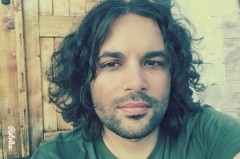
Boyan Tzenev
I hold a Master's degree of Management of Screen Arts and a Bachelor's degree of Screen Arts and Journalism from the National Academy of Theatre and Film Arts in Sofia, Bulgaria. Currently, I am a PhD candidate at the same Academy.
I hold a position as Film Expert at the Bulgarian National Film Archive since September 2019.
My responsibility is cataloguing Bulgarian and foreign films, social media communication about BNFA's activities and events held at the film archive's cinema.
This year BNFA took part in the second edition of A Season of Classic films, an initiative of the Association des Cinémathèques Européennes, dedicated to the idea of preserving European audiovisual cultural heritage. I was involved in the selection, preparation, and subtitling of a programme of silent films that was screened at the film archive's cinema and is still available on our YouTube channel. I participated in the programming of an event from May in collaboration with the Serbian film archive - Jugoslovenska kinoteka - Week of Serbian Cinema in Sofia.
Also, I was an editor on the English translation of the last book of an anthology series about Bulgarian feature films; a series of books that have been released periodically through the years.
Céline Vermeire
I am Céline Vermeire and since September 2021 I work as project manager for film digitisation at meemoo, the Flemish Institute for Archiving. As such I am responsible for the digitisation of the Flemish film heritage preserved by Flemish libraries, archives, museums, government agencies, performing arts organisations and broadcasters. While I have a master’s degree in history of art, heritage studies and digital humanities (universities of Gent, Amsterdam and Leuven), I haven’t had a particular training in audiovisual archiving. Therefore I consider BAVASS 2021 as the ideal opportunity to get up to speed with the most recent evolutions in the theory and practice of audiovisual archiving and film preservation in particular.
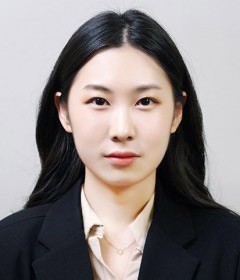
Eunjeong Yeo
2017.06.~2017.11.
· Image inspection and DCP
- 2K, 4K Digital Conversion
- Editing and Exporting digital cinema
- Digital Error Check
· Data management
· Remastering of the Busan International Film Festival
· Upload about 10 KMDB movies, including Korean classics
2020–Current
Restoring the Classics
- Using tools such as Diamant , PFClean
- Film Digital restoration
